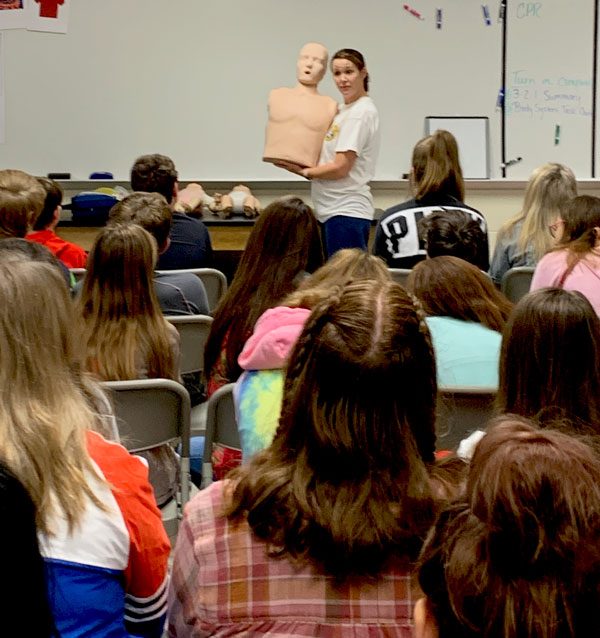By Jordan Beach
When Reinhardt faculty and students from the Cauble School of Nursing & Health Sciences aren’t teaching or learning about health and how to become nurses, they take their knowledge out to the community.

Over the course of last week, Reinhardt spent four days working with seventh-grade students at Pickens Junior High School to teach a variety of lifesaving skills.
“Over these four days, 374 seventh-grade students, plus six teachers, completed full training on CPR, AED, Stop the Bleed, and received a lesson on why these lifesaving activities actually work,” said Kimberly Parker, assistant professor of nursing. “We call that ‘the why behind the what.’”
Their time at PJHS started on Friday, Oct. 11 when Parker and Dr. Linda Morgan, associate professor of nursing, taught a class on the functions of the circulatory system and how the heart and lungs work together. Reinhardt returned to the school on Oct. 15 and 16 to teach CPR and AED while members of Pickens County Fire and Rescue taught Stop the Bleed, which shows its participants how to hold pressure, pack wounds and use a tourniquet.
The last day, Oct. 17, was spent showing the students how to apply what they learned with hands-on training that used mannequins and trainers.
“The Cauble School of Nursing has a unique ability to share health-related resources and education to people throughout Pickens County,” Parker said. “With over 4,200 students, the Pickens County school system is a gateway to the community as it provides a wonderful opportunity for us to bring our expertise and passion to where Pickens County families spend a great deal of time. By working with students in their own school setting, we are able to bring science to life and make health education relevant, and hopefully inspire healthy behaviors.”
While Reinhardt’s nursing students study to become trained professionals, they take opportunities to bring their knowledge and expertise to the Pickens County community, such as educational experiences and health fairs.
“Through the CPR and Stop The bleed training program, we were able to provide lifesaving education and training to 374 people, and have had students, families and teachers requesting more,” said Parker.

